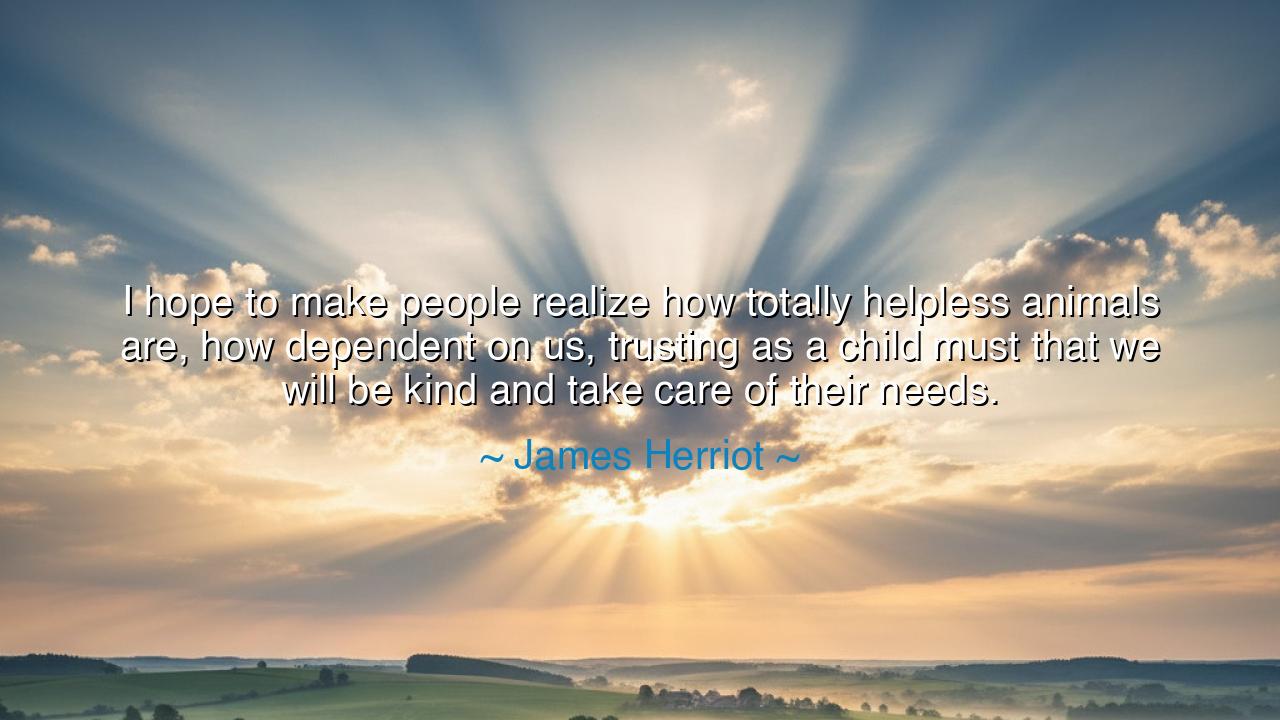
I hope to make people realize how totally helpless animals are
I hope to make people realize how totally helpless animals are, how dependent on us, trusting as a child must that we will be kind and take care of their needs.






In the gentle yet powerful words of James Herriot, the beloved healer of beasts and chronicler of the English countryside, there echoes a timeless truth: “I hope to make people realize how totally helpless animals are, how dependent on us, trusting as a child must that we will be kind and take care of their needs.” This is not merely the plea of a veterinarian—it is the voice of compassion speaking to all who hold dominion over the earth. Herriot’s words are a call to remember that power brings responsibility, and that in the eyes of every creature that looks to us for shelter and care, we are the gods of their small universe.
Herriot’s insight was born not in theory, but in life. As a country vet walking the windswept fields of Yorkshire, he saw every day the fragility of animals—their trust, their innocence, their silent suffering. He tended to lambs trembling in the cold, to loyal dogs whose eyes mirrored both pain and devotion, to weary horses that worked until their strength was spent. From these encounters, he learned that animals possess no weapons, no voices of protest, no systems of defense against cruelty or neglect. They live entirely by our mercy. Their trust, as he says, is like that of a child—pure, unquestioning, and sacred. To betray it is not only to harm them, but to diminish the humanity within ourselves.
The ancients, too, understood that the way a people treat their animals reveals the soul of their civilization. In the East, Ashoka the Great, emperor of India, inscribed upon stone his edicts of compassion, commanding that no creature should be slain without reason and that shelters and healers should be provided for both man and beast. “For,” he wrote, “all beings desire happiness; let us not deny to them what we seek for ourselves.” And in the West, the philosopher Pythagoras taught that the same divine spark that burns within man also burns within every living creature. To cause pain to an animal, he warned, was to wound one’s own spirit. These teachings echo Herriot’s own conviction—that kindness to animals is not a sentimental choice, but a moral duty, woven into the very fabric of virtue.
Herriot’s words also carry the tone of a lament—for he knew how easily the powerful forget the helpless. The farmer who grows indifferent to his cattle’s hunger, the owner who chains a dog in neglect, the merchant who sees life only in terms of profit—all of these are examples of what happens when compassion withers. Yet Herriot believed that if people could truly see animals as he did—not as property, but as companions in life’s journey—they would awaken to their own capacity for goodness. His mission, through story and healing, was to awaken empathy, to make hearts gentle again.
Consider the tale of Greyfriars Bobby, the small Skye Terrier who kept vigil by his master’s grave for fourteen years in the cold of Edinburgh. His loyalty outlasted death itself, and when the people saw this act of devotion, they built a monument to honor him. That story, like Herriot’s own life, reminds us that animals are capable of love purer and more steadfast than much of humanity. If such creatures can give love so freely, should we not offer protection, care, and kindness in return? Their dependence is not weakness—it is trust. And trust is the most sacred bond of all.
To care for animals, then, is to practice the highest form of stewardship. It teaches humility, patience, and mercy. It reminds us that all life—great and small—shares the same breath beneath the same sun. The shepherd who tends his flock, the child who feeds a stray cat, the family who adopts the abandoned dog—all perform acts of quiet heroism. For each small gesture of compassion ripples outward, restoring balance to a world often hardened by indifference. Herriot’s hope was that we, as a species, might awaken to this truth before it is too late—that we might see in the eyes of the animal not a lesser being, but a mirror reflecting our own moral worth.
So, my child of tomorrow, remember this teaching: kindness to the helpless is the truest measure of strength. When you meet an animal, do not look down upon it—kneel, if only in your heart, and recognize in it a fellow traveler on the path of life. Feed the hungry, comfort the frightened, protect the innocent. For these acts, humble as they may seem, are the foundation of a noble spirit.
And when you walk beneath the vast sky, hearing the rustle of wings or the soft tread of paws beside you, remember Herriot’s eternal wisdom: to care for the small and the voiceless is to honor the Creator Himself. Let that be your vow—to be kind, to be gentle, and to never forget the trust that the world’s creatures have placed in human hands.






AAdministratorAdministrator
Welcome, honored guests. Please leave a comment, we will respond soon